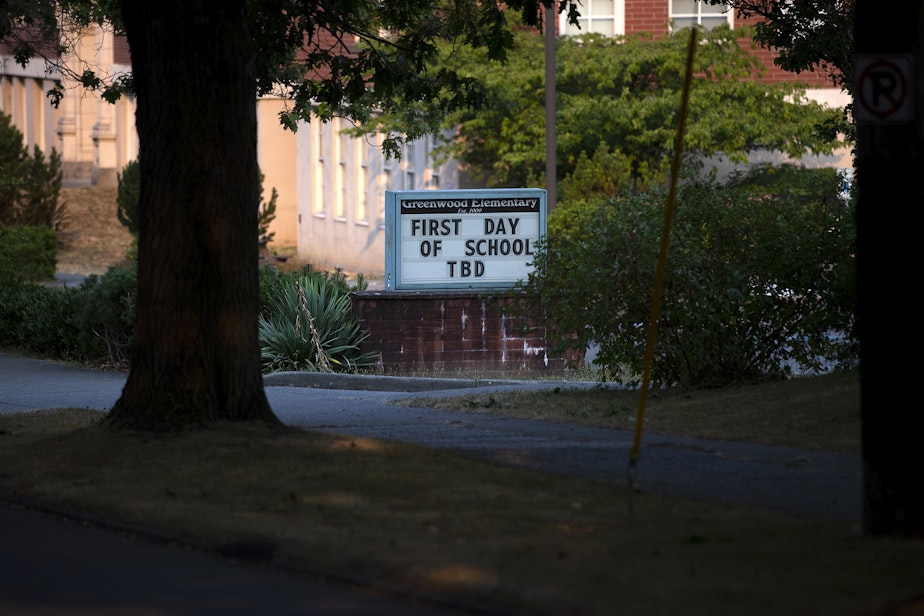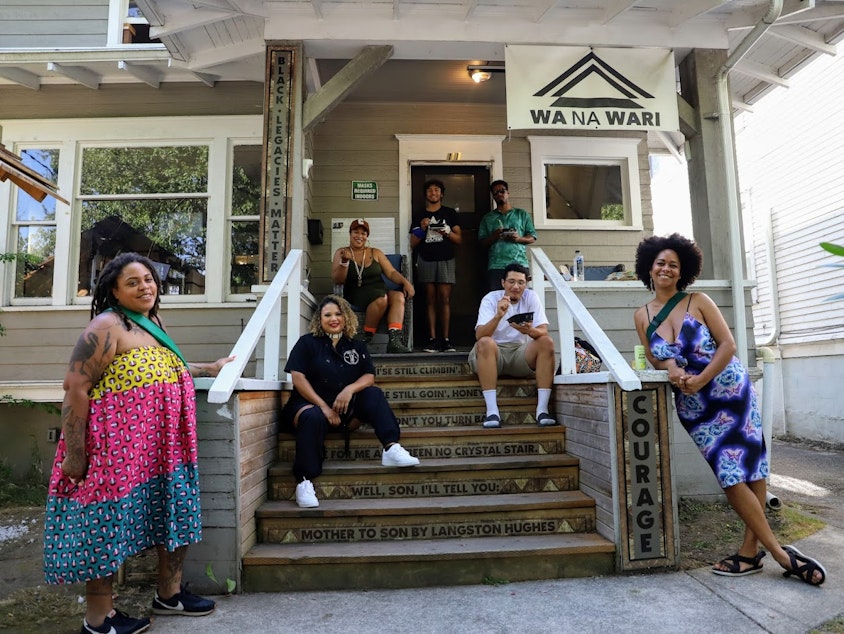Is Seattle about to go back to school?: Today So Far

- Seattle's teacher strike may soon come to an end.
- Western Washington may have to get used to wildfires getting closer.
- The University of Washington aims to divest from fossil fuels within five years.
This post originally appeared in KUOW's Today So Far newsletter for September 13, 2022.
If you're a parent of a Seattle student, good news: the teachers' union and the school district have a tentative agreement to end the current strike that has delayed the start of the school year.
If you're a Seattle student, sorry kid, summer is almost over, for real this time.
The tentative agreement came down late last night, so the union still has to vote on it. The district also has to re-plan the start of the school year, but the general vibe from union organizers and the district seems positive. So students can dust off their Pee-Chees and Trapper Keepers, roll out some fresh Lisa Frank stickers, and get those troll doll pencil toppers and milky gel pens ready ... those are all still things, right?
Wildfires throughout the Northwest have had us watching air quality monitors (air quality is pretty good as of this morning). Usually, fire season sends smoke into Western Washington from areas east of the Cascades. But blazes are getting closer and closer west. The Bolt Creek fire is proving to be a lesson in this. So far, it has burned 7,660 acres around the border of Snohomish and King counties.
One lesson came from a pair of hikers who filmed their series of life-threatening mistakes that put them up close with the Bolt Creek fire.
Sponsored
Conditions in the area are making it difficult to control this wildfire. A fire this severe has not been experienced in that area for at least 100 years, so there is a lot of debris/fuel on the ground to feed it. The mountain town of Index, 40 miles east of Seattle, has had to learn how and when to evacuate, quickly.
Amanda Montei is a former firefighter based in Bothell. She says there's another lesson the Bolt Creek fire is teaching us: "It's something we should consider to be our new reality, and therefore start figuring out how we can adapt to those conditions and to the potential for fire in our neighborhoods."
"Moving forward, we can expect to have more events like this," Montei told Seattle Now. "The western Cascades are traditionally known as this high severity, low frequency fire regime ... so when you do see fire, it's going to be really intense, even if you only see it every 100 years in some areas, maybe seen 200 or 300 years in certain areas."
Montei says that the eastside of the state has become used to wildfires in recent years, but the westside is not as aware.
"It's fair to predict that we will see more fires like this in our backyards on the west side of the Cascades, which feels very rare and feels very unprecedented for folks who have lived in this area for decades."
Sponsored
Hear Montei's full conversation with Seattle Now here.
The University of Washington Board of Regents has approved a resolution to divest from fossil fuels. This means that UW has five years to back out of any investments that aren't so carbon friendly. The resolution also includes a goal of investing 2.5% of the university's endowment fund in companies involved with climate solutions.
For those who don't generally dabble with university endowments, the basic rundown is this: People donate money to UW, and the university turns around and invests that money. The investment revenue is used to fund programs at UW. This fund has invested in, and profited from, fossil fuel-related industries. And that doesn't sit well with a lot of students who care about climate change. With this new resolution, that financial situation will phase out by 2027. Read more here.
Want more updates? Check out KUOW's News Blog!
AS SEEN ON KUOW
Sponsored

From left, Wa Na Wari curator Elisheba Johnson, Chef Lakea Osias, Soulma Ayers-Hardiman are part of Love Offering, a community meal program in Seattle's Central District. When you think of an arts space, you think of pictures, paintings, or other kinds of visual art – they’re the main course. But also on the menu at Wa Na Wari is food. Three days a week, this center for Black art gives out free meals to anyone who drops by. (Juan Pablo Chiquiza / KUOW)
DID YOU KNOW?
Pullman is the lentil capital of the world. I was snarky about this factoid yesterday, but it's actually a pretty cool designation, literally. The Palouse area is generally cooler than neighboring regions (and a bit drier), making it more ideal for growing the legume. That's why Pullman is so keen on lentils and why so many are grown there. The majority of lentils in the USA were once grown in the region. Now, about 18%-ish are, according to the most recent count I could find. But lentil pride remains strong in Pullman. Since 1989, the city has held the annual National Lentil Festival, celebrating the legume.
ALSO ON OUR MINDS
Sponsored

The economics behind 'quiet quitting' — and what we should call it instead
Maybe "quiet quitting" is just an extension of "The Great Resignation." Maybe a large chunk of our labor force was always phoning it in, but now they have a loud social-media presence and better branding. Maybe it's people feeling like suckers for going the extra mile pre-pandemic just to get laid off en masse. Or maybe quiet quitting is a BS pseudo-trend. To be honest, we don't know. But there is at least some data to suggest there's something real going in the psyche of the workforce.

